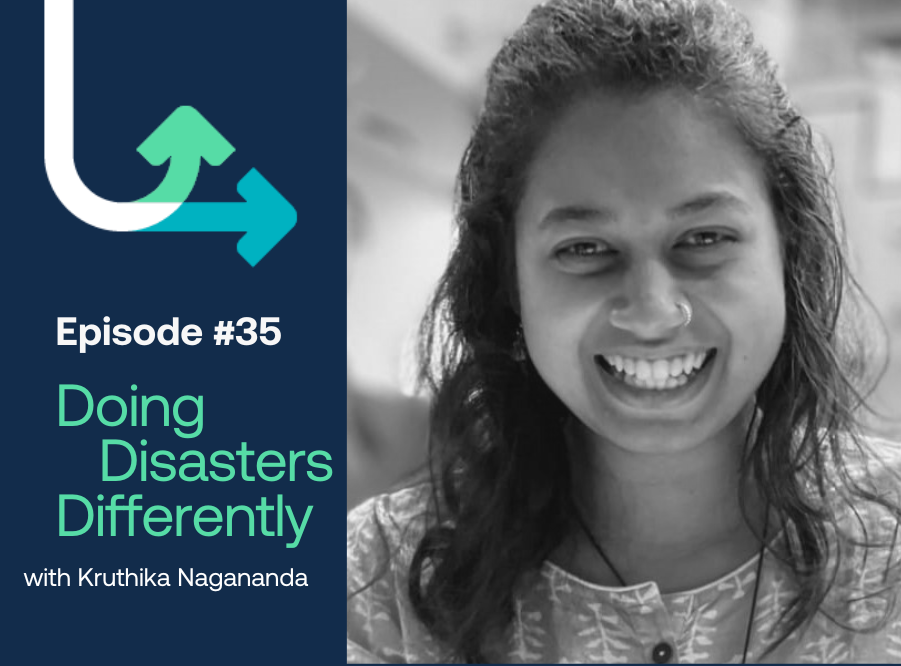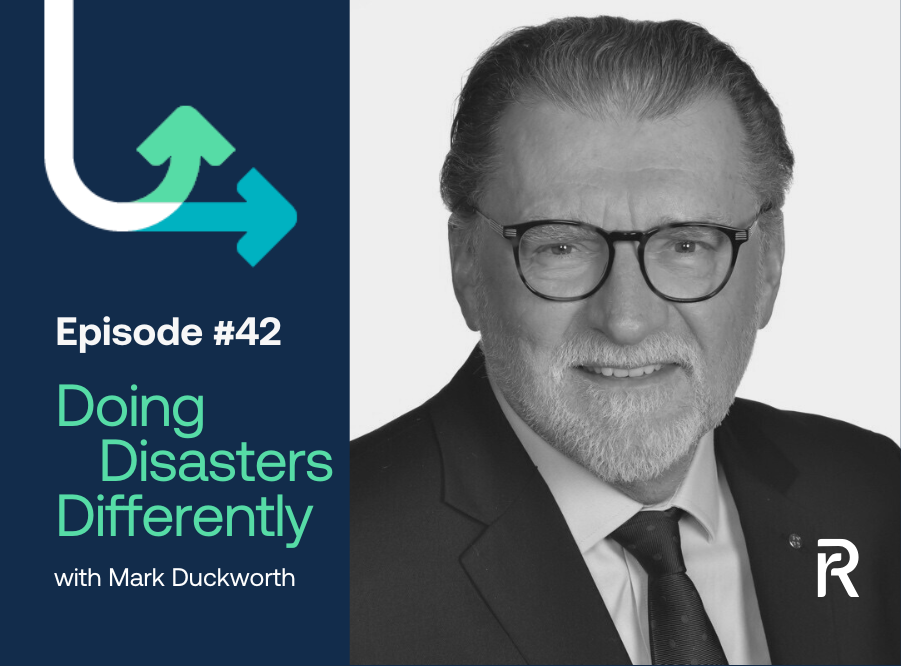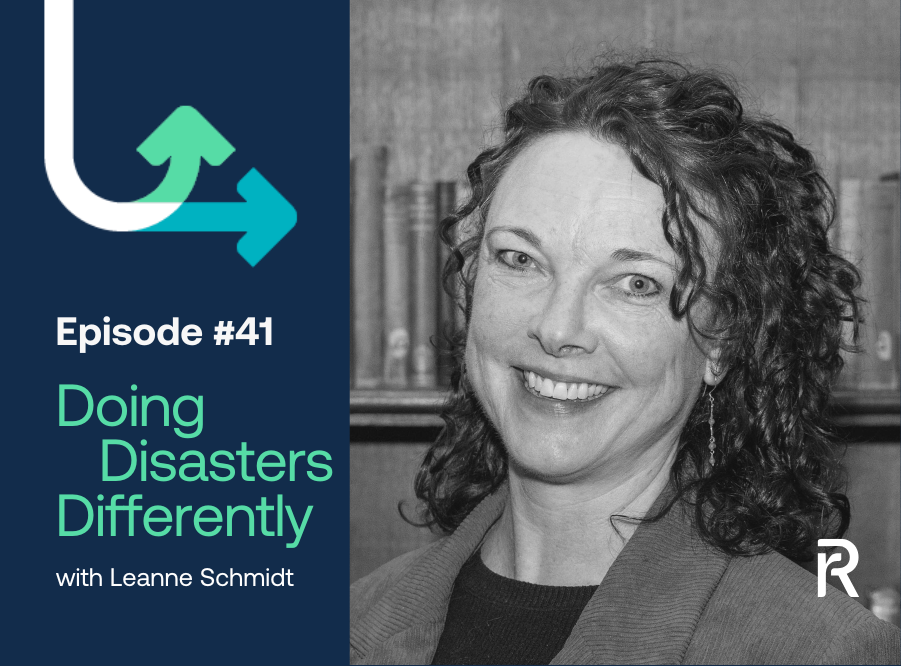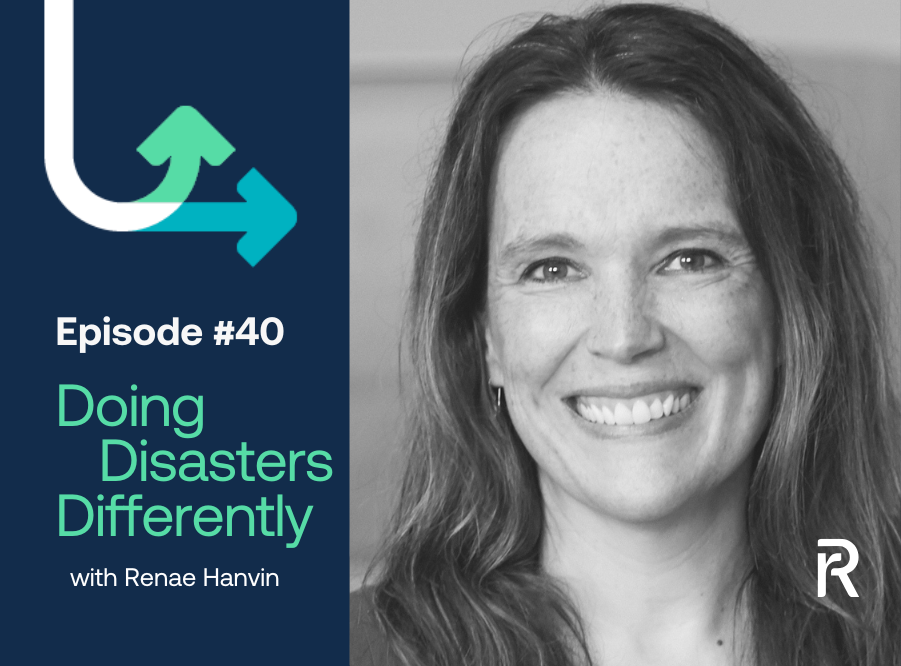
Podcast / Episode #35
Episode #35: From India to Australia for resilience
By renae hanvin
Dec 11 2024
This episode
In this week’s episode of Doing Disasters Differently, Renae is talking with Kruthika Nagananda, a passionate advocate for resilience who moved from India to Australia to pursue her dream of strengthening communities in times of crisis. Today, we are talking about Kruthika’s journey, from completing her Master’s in Disaster Resilience and Sustainable Development at the University of Newcastle to her work in disaster risk reduction at the Walcha Council and now with the Australian Red Cross in the Urban Climate Resilience Program.
key moments from the conversation
Kruthika Nagananda likes to consider herself as a girl from India dreaming about strengthening communities during this struggle, especially during crisis, such as disasters and climate induced crisis. In search of this dream, she landed in Australia and completed her Master’s in disaster resilience and sustainable development at the University of Newcastle. She’s had experiences in various non-governmental organisations in India and the world such as the UN-habitat, Maya MA, and Indian Institute of Human Settlement on waste water and climate related disasters. In Australia. She’s worked at the Walcha Council as the disaster risk reduction coordinator, and now the Australian Red Cross as a project officer in Urban Climate Resilience Program.
It’s one of my must attend conferences, and we’ve had a stand in resilience lane. So I was really busy building social capital with lots of my bridging Thai friends. At one point, Ashley Brady, who’s a great next generation of disaster resilience, person, she came to say hello and she had a lovely friend with her. Now, when Ashley introduced me to Kruthika, she was smiling at me with this beautiful big grin, and she seemed almost scared or a bit bashful about meeting me. I wasn’t quite sure why until Kruthika told me that she moved from India to Australia because of listening to this Doing Disasters Differently podcast. Wow. I mean, I do the podcast because I love having conversations. I never thought these conversations would make someone pack up and move to a new continent to be part of the resilience ecosystem in Australia. I love Kruthika story and how she’s forging her own path in Australia from working at the Walcha Council and now at the Red Cross. Kruthika is so lovely to chat with you. Okay, let’s start with Kruthika.
1. So you moved to Australia because of my podcast. Please tell me what were you doing while you were in India?
Kruthika Nagananda
Thank you, Renae. Thank you so much for having me. I actually finished my architecture degree seven years ago, and I was working on environmental and social problems and trying to find designs for that. That’s when, I understood and I came across communities which had a lot of issues, especially, in India when it gets overlapped, social, socioeconomic and environmental problems often gets overlapped there. And I started working with two different charity organisations on urban water systems and integrated, urban water, management. So that was a very interesting experience. I worked in a place where it was predicted to have a zero day, which means no water. And then, and then all of a sudden there were citizens and people and communities that came up and they started working on these issues and starting to save lakes water security. And it was amazing to work with communities and that’s one of the greatest lessons I had, was to see how citizen led and community led can make changes.
So yeah, that, that’s what I did. But however, it’s interesting how I came into disaster space. I was working in one of the rural Karnataka, rural India in one of the villages, and we were working on socioeconomic problems and, environmental problems. We had mapped all the problems and we were trying to address it. And it was during floods and during monsoons we have monsoons in India and during floods it gets overwhelming, it gets too much. And we were stranded there for three, four days with floods. And it’s so bizarre because I was standing there and I could still visualize it. There were two different houses, one which was really concrete, had plinth and other was a hut, and there were flood waters everywhere. And the man who was in the hut, he was actually taking a bucket from, he was filling the water from the house and putting it across to the street where again, water is everywhere. And that’s when I could see and realise how every problem that we had mapped just get exacerbated during any disasters. And that’s when I started to think. And yeah, that led to my exploration to disasters. And I did my Masters here.
Renae Hanvin
I know, and I love, so I’ve been to India a couple of times actually. And when I was there, there was a, torrential downpour and my gosh, the water levels got up so fast so quickly. And then it went down so fast, so quickly, but the impact was quite extreme. So you moved to Australia and you told me, which again, I was so blown away by, but my little podcast had a bit of a, a bit of a, a moment of, sunshine there by helping you decide was it a particular episode that you listened to or how, I don’t know. I’m so passionate about us needing to be doing disasters differently, and you thought, hey, I wanna do that too.
2. What made you decide to move to Australia?
Kruthika Nagananda
Actually, that’s a good question. During my quest for this disaster studies, I had applied to many universities and I also had offers, in most, in few of the universities that I had applied. But I think I came across your episode was your second episode, and I was trying to understand how I can map these environmental and socioeconomic problems and what is that term that could integrate it and help the communities. that’s when I realised and understood the word resilient resilience. That was the term and quest. I think you were the one who brought it across to disaster world in Australia.
Renae Hanvin
No, no, no, no. I just talk about it. I certainly didn’t bring it across, but I I like to, make it happen, I guess in build, embed it.
Kruthika Nagananda
No. Yeah. It was a great, that that’s when I actually understood and I was like, wow, this is the term, this is the quest. This is the term I want to more explore and try to see where it leads. And it, this was also the time when I think 2019-20 disasters just had finished. And that was a Covid times, and you were exploring your quest of resilience through doing disasters differently. And that beautifully coincided with mine. And, and I had to come here and learn more about it because this is where all those conversations were happening and I really wanted to be a part of it.
Renae Hanvin
I love that.
Kruthika Nagananda
Had to say, and I had to say, your podcast helped me a lot with my assignments as well. Having to come to Australia where I had no clue about Australian planning or strategy on disasters. Your podcast went into depth of it and yeah, I could pick up a lot of pointers and lot of information through it, so I’m very thankful for that.
Renae Hanvin
Oh, well, thank you. Gosh, I’m very happy to help with assignments and I think the focus that I bring is probably just a different approach. And again, think d we need to think different and we need to do different. So I’m, well, I’m very grateful. Well, I’m very happy that I was able to help your uni assignments and what not. And I guess Australia is definitely, definitely, definitely, the winner in terms of choosing to come here. So the fact that I had a little bit to do that, yeah. Well, that’s pretty cool. Now you came to Australia and you got the role, so you were studying obviously, and you got the role as the disaster risk reduction coordinator at Walcha Council. And for those who don’t know, Walcha is a beautiful small town in New South Wales. So we’ve done quite a little bit of work, with the farming community up there. Now tell me about your role at Walcha and, you know, what did you love about living there? And you mentioned before, you know, part of your passion is seeing communities and you know, what they can do and how they react and how they respond and how you can enhance them.
3. So what did you love about living and being part of the Walcha community?
Kruthika Nagananda
It was a very different experience. My role was called a Disaster Risk Reduction Coordinator, and it was to work with communities and do the disaster risk reduction, which is a challenge. I was entirely from a different country in a small town for 3000 population. And I came from the city which had 13.6 million people.
Renae Hanvin
Wow, okay.
Kruthika Nagananda
And that was a drastic change, but it was lovely as well, because everybody knows everybody in the small communities, and you get to work literally with everyone, and they’re so loving and accepting. So I, and you can see the changes, right? And you can see the work. It’s very rewarding. I would definitely encourage anybody who wants to do a who wants to take the opportunity there, I would really support that decision.
Renae Hanvin
Yeah. I guess if you’re gonna come, you know, you’re gonna change and learn something new and do something new in a new country, you might as well go to the complete opposite to what you know and what you think.
4. Now, what were some of the risks facing Walcha in, in your role as the disaster risk reduction coordinator? What were the main sort of risks that you were looking at?
Kruthika Nagananda
In terms of disasters I would say bushfires and storms, not so much, of floods because of the topography of Walcha. It’s almost at the top of New South Wales, so not so much of floods, but of course, drought, bushfires and storms were very common and also many agriculturists, when they think about farming, the first and foremost most concern is drought. And within the project that I was working, of course, there was no drought included. And whenever I would go and talk to the community, they’d be like, Bush fires and drought has to be included together. It, it’s two different disasters. It works simultaneously. You need to do it. So I used to work with community and probe them to think and come up with solutions for these two different disasters to be integrated, which was also very interesting. And in terms of other risks, I would say it is, the community has a lot of fear about becoming a ghost town because of the population which is declining and also aged population, it’s really concerning to see that, many of the businesses as well within the smaller communities, they are declining and dying, which is so unfortunate because these communities have so much, much to give.
Renae Hanvin
Yeah, I mean that, the changing face of some of these little towns Yeah. Is, is real and it is a real risk and it is a real issue and it’s a real shame. So for some of those communities. So I love that. I guess, you know, you haven’t just talked, talked about the natural hazard type elements and the whole bushfire versus drought versus what’s included in what pocket of funding and focus. I think that requires, a whole other series of podcasts probably to get to the answer of that one. but I think what I loved about hearing, again, we’ve done a lot of work in Walcha and I was hearing from lots of different people that, you know, you brought a different approach and a different way of thinking into, the community. And I’ve only ever heard really, really wonderful things about you from the people in Walcha.
Renae Hanvin
And I, you know, I don’t, I mean, that’s not normal. Normally they complain about, you know, people who are just coming in who are strangers, but you know, everyone I spoke to, in the local area and community at events and councils and that, ’cause you were so passionate and dedicated to building resilience amongst that community and understanding and connecting with that community. And I know you led a few projects including one about capturing stories, which I just think was so wonderful. I remember you sharing it with me saying, oh, you might like to know what I’ve been doing. And I’m like, this is awesome. Can you tell us some more?
5. Tell me, tell our listeners a bit more about what you were doing?
Kruthika Nagananda
Surely. Yeah. so the project, was funded and it was to bring out the disaster risk production action plan within the community. And I had divided that into four different section. One was community, of course, general community. Second was businesses because, they were small business and farming business as well, so to focus on their resilience. And the third it was council because council also needed its own pocket of education and advocacy in terms of disasters. And the fourth one was schools, because schools were often though centric when, when it comes to disasters, and that needed more of preparedness as well. So having these four in mind, I also initiated something called resilience stories. There was so much knowledge and so much information that they had experience, and I was very curious to know what they have got to say and what they had learned.
Kruthika Nagananda
I still remember the first resilience story that I did, and there was this quote, I think it was from Rob Robert Bloomfield, and he said, dear, oh dear, where does it all, when does it all end from going through storms, drought, bush fires to covid and unbelievable rains for the last three years? And then he ends up saying, I realised it all ends. It made me realise that I can survive and be resilient. And these sort of quotes and these sort of information that is embedded within the community, even though they have gone through so much tough situations, they’re still able to overcome. So that was one of the main ideas and main, agenda for the resilience story as well. It was to educate people to learn more from what they have learned as well as to give them some sort of strength, saying that there is so much, community connectedness and strength within the community as as such it is so important to keep that thriving. And of course the third, third was to let them know that these evidences can obviously be important for any sort of disaster risk reduction movement to push it through the departments and the government to say, so many good things are happening and we need to invest more.
Renae Hanvin
I think, and again, your, you know, the stories are all about sharing that lived experience. And I know we embed it into all our micro learning programs to get, you know, people, you know, people talking to people because, you know, we can, as I guess, you know, leaders of change and government and councils, you can tell people what to do, but you know, you’re not gonna have the same, connection or relevance then if you have a like-minded person sharing their story. And what I loved most about your project was it was so respectful and considerate, but it enabled people to take that step back. And I love the quote that you just said about it, you know, that self discovery by, you know, thinking differently about what has happened, knowing that it’s possibly gonna happen again. So, you know, enabling, you know, all people within the community, including councils and that to sort of go, okay, well, you know, we’re actually better than we thought we were and you know, what can we do to kind of enhance that as well? So it’s, yeah, it’s a really, really great project. And I know there was a lot of people who rang me when they heard that you were leaving and they’re like, no, she can’t go. She can’t go. But you left Walcha and you moved to Sydney to work with the Red Cross where you’re working with now. lucky, lucky Red Cross.
6. So how is it different going from a small town in Australia to a pretty big, you’re in a pretty big, big city in Australia now?
Kruthika Nagananda
A hundred percent. That is very aptly put Renae, it was the smallest council, I think in New South Wales to the biggest LGA in New South Wales. Wow. Two different, it’s fascinating. Again, in Walcha was mostly a small community and it was the similar sort of community as well. However, here it’s very diverse and having to communicate and navigate through conversations with very diverse group and a large group, it has definitely been a challenge. And also to understand who is who in the zoo, because in urban context it gets so much more challenging to understand who is doing what.
Renae Hanvin
Correct. And sorry, just remind, remind or let everyone know where you are. So you’re in,
Kruthika Nagananda
Oh, sorry. I’m in Sydney now and working with Blacktown. Yes, yep. Canterbury and Bankstown communities.
Renae Hanvin
Correct. Well, we know, yes. Sydney’s a huge, cohort of LGAs compared to, I didn’t realise Walcha was the smallest one. Gosh, you really did go from a zero to huge numbers in that change. Absolutely. Such a great opportunity to bring all your knowledge and experience.
7. And so what’s your role at the Red Cross? What’s your role now then?
Kruthika Nagananda
I’m working as project officer in emergency services and I’m working on a particular project called Urban Climate Resilience Program. And this is focused on heat waves. And that’s exactly why three communities are chosen to understand what heat waves do to these communities and work with these communities to build, heatwave resilience. And of course we are looking for opportunities to expand it as well, but these are the three communities we thought were really at risk and needs most help.
Renae Hanvin
Yeah, and I think again, the climate component of the, you know, disasters, I mean we have an all has its focus, which of course includes climate, change and adaptation. It’s absolutely critical. So lucky, lucky, Bankstown and Sydney to be having you looking at their heat waves. So, okay. Core question.
8. Has your move to Australia been what you thought it would be and are you doing disasters differently?
Kruthika Nagananda
A lot differently, I would say, I was reading this question and I was trying to understand going through my assignments as well and trying to see how different is my thought. I suppose in the context of India, it is more of management and less of resilience and I’ve been able to explore a lot more about resilience and about community and the importance of community led, disasters and also, I would like to say resilient ready communities, that is one of the things that I’ve really discovered here, pun intended.
Renae Hanvin
Yeah, we do, we do need to make our communities and businesses resilient and ready for all types of disasters, don’t we Kruthika?
Kruthika Nagananda
Yes, absolutely. And one more in interesting thing I found in Australia is to have a psychosocial aspect that we were discussing earlier as well, Renae, to actually keep people’s interests and have community at the centric of all the decision making and, planning, which is very core. And I’ve absolutely seen that and learned from Australia.
Renae Hanvin
Yeah. Oh, that’s so great to hear. I agree. I mean, you know, community needs led community wants, led community building, community focus. I mean that’s, you know, it really does need to be at the epicenter and I think, I think it’s getting better, but I think there’s still a big, opportunity to go. and that’s why we are very excited obviously with the social capital and social infrastructure project that we’ll be, kicking off soon with Professor Daniel Aldrich. So we can measure, you know, the people connections and the places people connect and embed that into the ecosystem.
Kruthika Nagananda
One of the things I would like to do differently is decentralizing disasters. in a place like Walcha, when I went and started talking to the community about risk reduction and resilience, often I would hear issues like, oh, we do not have medical facilities, we do not have convenience store, we don’t have enough facilities around. And I would wonder and think, what would I do with the project having these issues? But then I realised these are very centric to the problems when there are, when there is a disaster, these are the main issues that’s actually seen and these are the needs of the community as well. And it’s very important to include those issues in the planning and strategy or in the project while we are doing. So, that is one of the things I would do differently to include these problems. And secondly, I would say having a global vision for the disasters. We have such local understanding and we look at disaster and very, minute scale. However, we know that the changing climate and with repeated disasters and getting more intense, it’s gonna impact different countries in a different way. And having one understanding would probably not be sufficient. We need to understand in a global manner, which you do beautifully. So you have been working on it trying to see how every country impacts in a different way and get those learnings.
Renae Hanvin
So what I hear you saying are you, you’re subtly saying that we need to go build a and ready world. So there we go. We’ll just maybe we’ll save that for next year too. We’ll just create a global, a global approach to, disaster risk reduction and resilience. Very important. Thanks Kruthika. You know, you’ve just given me a little challenge now. I’m gonna have to write that on the, on the forward planning board. It’s been so lovely to chat with you again. I was so, I didn’t quite know what to say and respond to you when I met you at that conference, the first year. And, beautiful Ashley introduced us, but I’m so grateful that you have come to Australia and you’re bringing not just your insights and your learnings, but your passion because you really are making some changes. So thank you so big thank you to Kruthika Nagananda for talking to me about from India to Australia for resilience. Again, thanks so much for talking with me.
Kruthika Nagananda
Thank you so much Renae for having me. It’s been such a pleasure.



